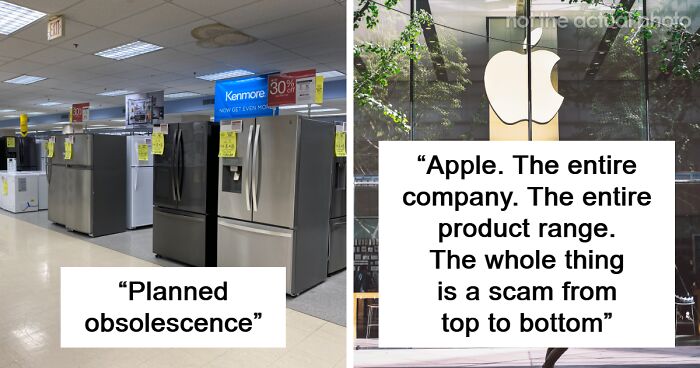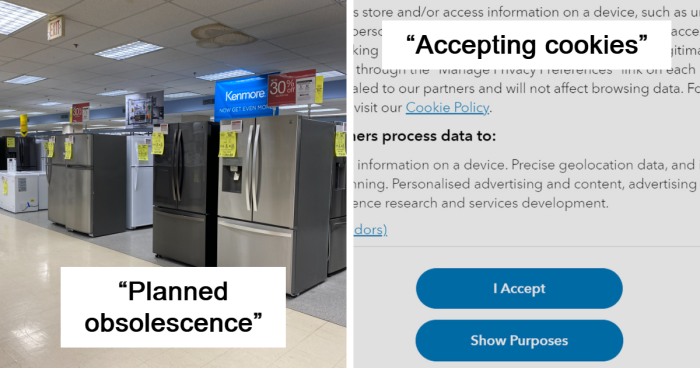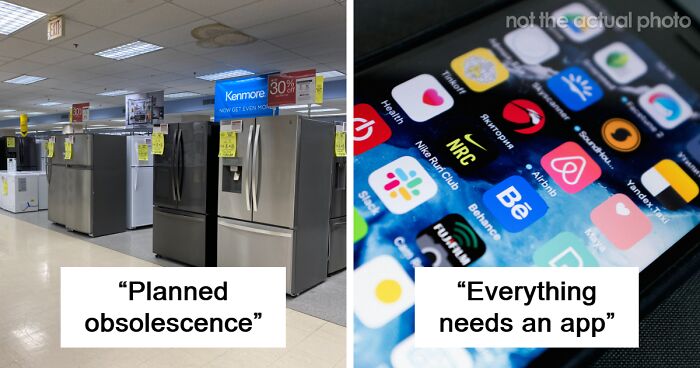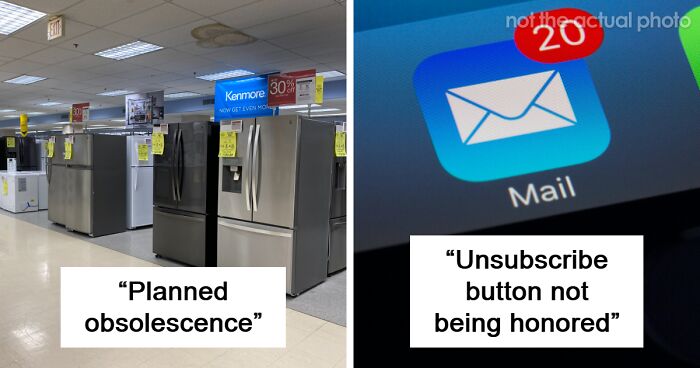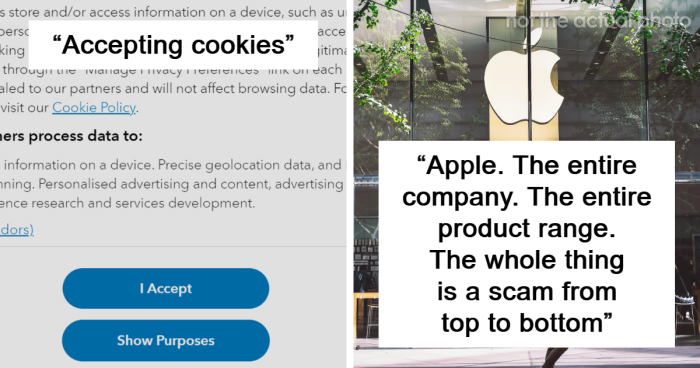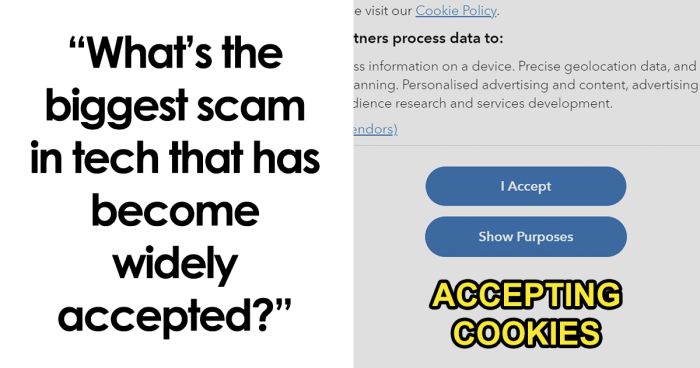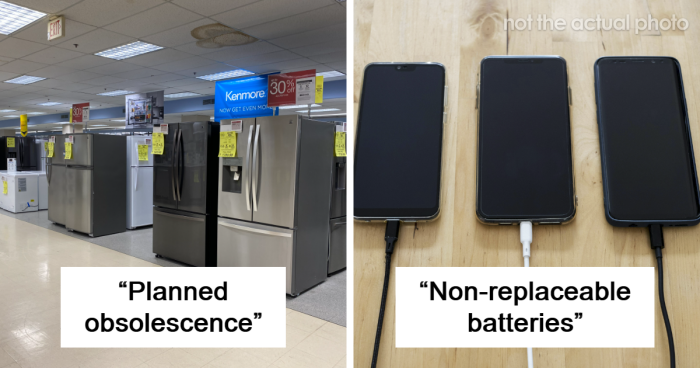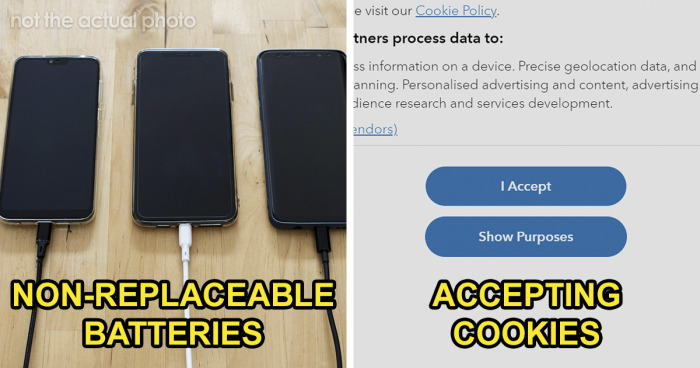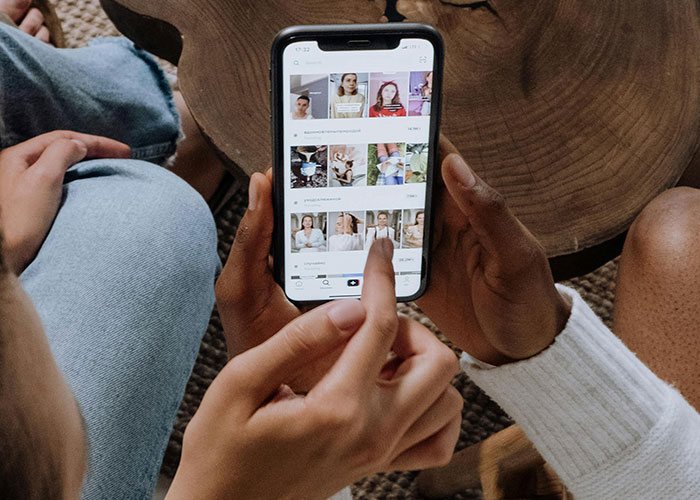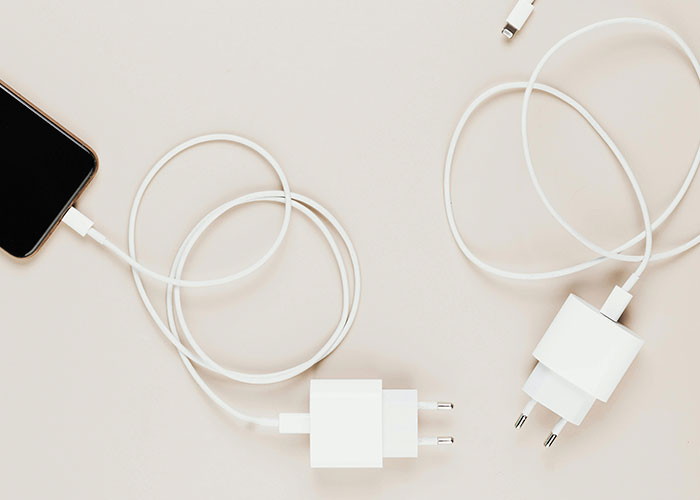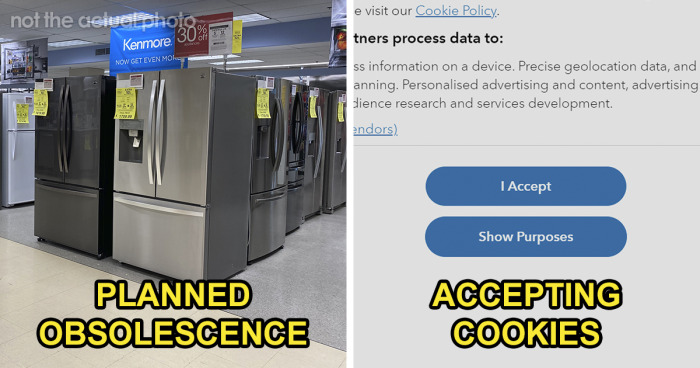
“If Buying Isn’t Owning, Piracy Isn’t Stealing”: 35 Tech Products That Are Huge Scams
Interview With ExpertLook around you and ask yourself: is this the type of futuristic life that you thought you’d have? For some of us, that answer is a definite ‘no’ because it strays too far from the idealized things we’ve seen in our favorite sci-fi movies and shows. In real life, there’s too much friction, bad design, and annoyance compared to technological awesomeness. In short, some tech corporations are less than friendly toward their valued customers in their pursuit of profit and never-ending growth.
User u/cutypatotie sparked an interesting discussion on r/AskReddit after asking everyone to share their opinions about the biggest tech scams that have been widely accepted. We’ve collected the most interesting insights to share with you, from how God-awful subscriptions can be to the scourge that is planned obsolescence.
We wanted to learn more about user-(un)friendly companies and product longevity, so we reached out to marketing psychology speaker Matt Johnson, Ph.D., for comment. Johnson is the host of the branding and human nature blogs. You'll find the expert insights he shared with Bored Panda as you read on.
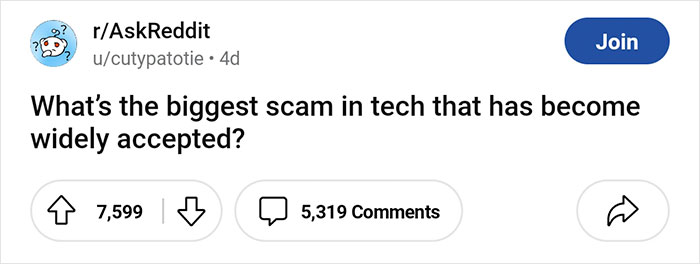
This post may include affiliate links.
 “We have changed our terms of service. Click here to accept and continue using our services.”
“We have changed our terms of service. Click here to accept and continue using our services.”
IamShellingFord:
Forced arbitration and changing the terms of service after the product has been bought
when i bought my device, i had an understanding of what i was buying. it makes my skin crawl knowing that companies can change that after i paid for something and i can't hold them accountable for that.
it's like i bought a pizza with some toppings.
after i buy it with the terms being i can eat the toppings as well, they take away the toppings from the rest of the pizza as soon as I've had a couple of slices.
feels absolutely disgusting to me.
According to marketing psychology speaker Johnson, companies that aren't user-friendly aren't in the long-term loyalty game. It's not a priority for them. "Instead, they often prioritize factors like cost cutting, technical limitations, industry norms, and corporate culture over user experience. Cost considerations might lead them to cut corners in research, design, and testing, while technical constraints, particularly in highly regulated industries, can make creating user-friendly interfaces challenging," he explained to Bored Panda via email.
"This also comes up a lot in industries where usability isn't traditionally a priority. Here, companies may focus more on functionality and reliability. Corporate cultures that value other aspects of business, like engineering excellence or speed of delivery, may also contribute to the lack of emphasis on user-centric design practices," Johnson explained.
However, those aren't the only considerations. Some companies might fundamentally lack the understanding or the resources for effective research and testing when it comes to user experience. Not only that but their short-term goals or market dominance may make them less likely to invest in user experience in the first place. Put simply, there’s a lack of resources, know-how, or urgency.
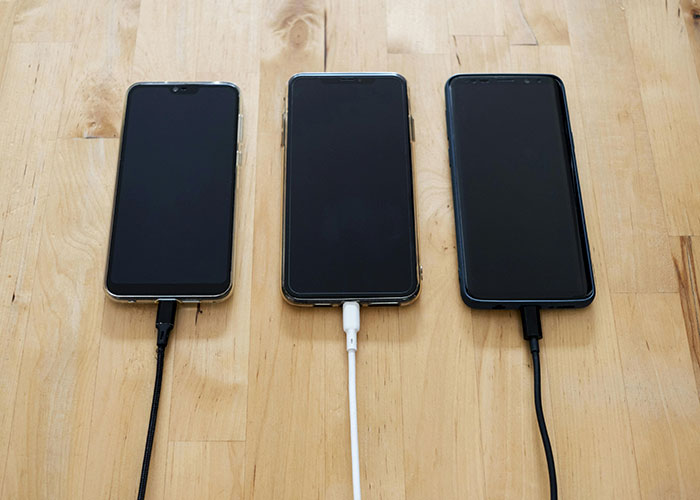 Non-replaceable batteries.
Non-replaceable batteries.
Thankfully in the EU from 2027 all new phone will have replacable batteries. Guess I will wait to replace mine! https://mashable.com/article/replaceable-batteries-smartphones-iphones-2027
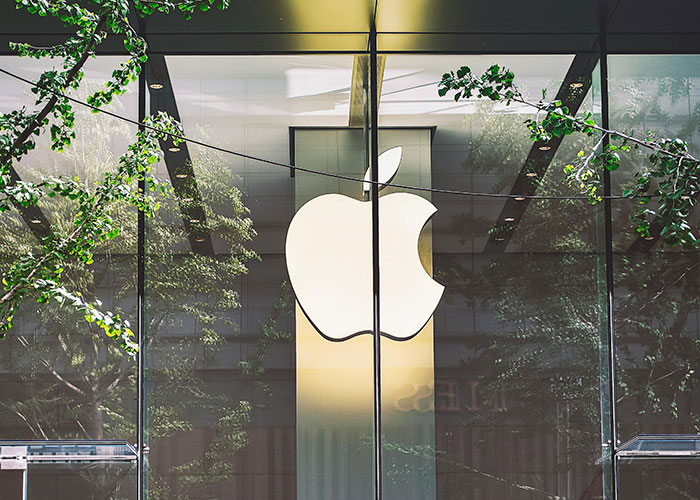 Apple. The entire company. The entire product range. The whole thing is a scam from top to bottom. Paying double what the stuff is worth for a subpar operating system and the privilege of being locked into their ecosystem and their predatory app store. Their anti-competitive business practices are disgraceful and I hope the SEC/DOJ burns them to the ground. What they did to the USB-C ports on the new iPhone is a new and special level of s****y. Seriously people, stop buying Apple's overpriced and poorly made garbage.
Apple. The entire company. The entire product range. The whole thing is a scam from top to bottom. Paying double what the stuff is worth for a subpar operating system and the privilege of being locked into their ecosystem and their predatory app store. Their anti-competitive business practices are disgraceful and I hope the SEC/DOJ burns them to the ground. What they did to the USB-C ports on the new iPhone is a new and special level of s****y. Seriously people, stop buying Apple's overpriced and poorly made garbage.
"Overall, a combination of financial, technical, cultural, and market factors drives companies that aren't user-friendly to prioritize other considerations over creating intuitive and accessible products and services," Johnson said.
Bored Panda was curious about what could convince companies to invest more into improving their products' longevity. After all, many of us feel like we have to replace or upgrade many of our tech gadgets quite frequently. (When's the last time you had to get a new smartphone because your old one was on its last legs?)
Johnson said that, ultimately, this comes down to changing the organization itself so that it adopts long-term thinking with respect to their customers. This means instilling the belief that the company will be rewarded with “the goodwill and repeat patronage of their customers” if they create “high-quality, long-lasting products.”
Naturally, this is far easier said than done. "Improving product longevity requires businesses to rethink their approach to design, manufacturing, and consumer relationships. Firstly, investing in quality materials and craftsmanship can enhance durability, reducing the need for frequent replacements. For instance, companies like Patagonia have built a reputation for durable outdoor clothing that lasts for years, backed by repair services that extend product life," Johnson told Bored Panda.
 Trapping customers with subscriptions.
Trapping customers with subscriptions.
"Are you sure you want to cancel? We can offer you a discount of 3 months for £3.99 to stay with us!" So you're basically proving that you're overcharging us in the first place like...
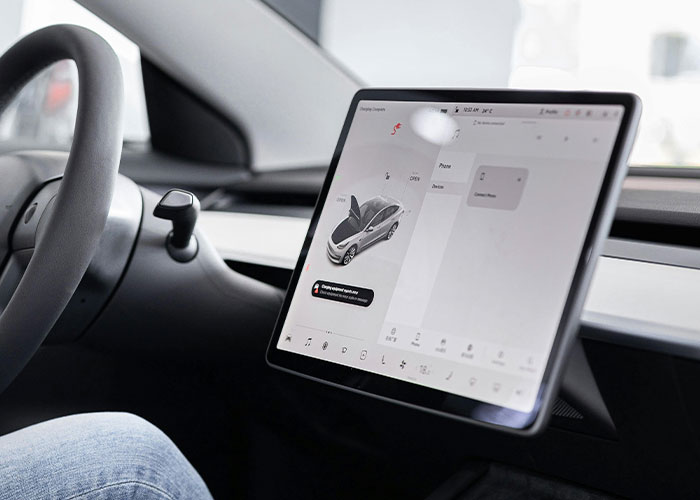 Replacing physical controls and digital displays with in built tablets in cars. I can no longer safely operate the climate control, media player or any of my other car systems without having to physically stare at a massive f*****g touchscreen with s****y touch response and laggy ui that gets worse with every patch.
Replacing physical controls and digital displays with in built tablets in cars. I can no longer safely operate the climate control, media player or any of my other car systems without having to physically stare at a massive f*****g touchscreen with s****y touch response and laggy ui that gets worse with every patch.
This needs to be banned as a serious safety concern. It's distracted driving, plain and simple.
 Planned obsolescence. Companies need that profit margin, and they will use very underhanded methods to make sure your appliances/electronics will get replaced by their new models when they come out.
Planned obsolescence. Companies need that profit margin, and they will use very underhanded methods to make sure your appliances/electronics will get replaced by their new models when they come out.
"Secondly, adopting modular design principles allows for easy repairs and upgrades, extending the usefulness of products over time. Smartphone manufacturer Fairphone, for example, designs its devices with modular components, enabling users to replace individual parts rather than the entire phone. Additionally, offering software updates and support for older devices can help maintain functionality and security, as seen with Apple's long-term support for its iPhones and iPads," he gave some examples where companies are more consumer-friendly.
"Lastly, implementing buy-back or trade-in programs incentivizes customers to return old products, fostering a circular economy where materials are reused or recycled, as demonstrated by companies like Tesla with its battery recycling initiatives. By embracing these strategies, businesses can get out of the short designed obsolescence game and enter the much more lucrative long-term game. Done right, and it will not only improve their products’ longevity but also foster customer loyalty and contribute to sustainability efforts, ultimately benefiting both consumers and the environment.” For some more expert insights, feel free to take a look at Johnson's branding and human nature blogs.
 Intentionally downgrading older models of just about anything so you’re forced to upgrade.
Intentionally downgrading older models of just about anything so you’re forced to upgrade.
 Physical banks fees on everything digitally executed.
Physical banks fees on everything digitally executed.
You want to move your money : transaction fees
You want to keep your money : account management fees
You want to withdraw your money : fees again
Seriously, everything works on its own with technology, no human intervention 99% of the time. Banks already make money from loan interests while giving us back s****y return interest to borrow our money to go make millions of profits.
Having to pay for basics and automated operations is a ripp off.
My bank doesn't do any of these things. I'm with a Credit Union so I can use any other local credit union ATM for free even.
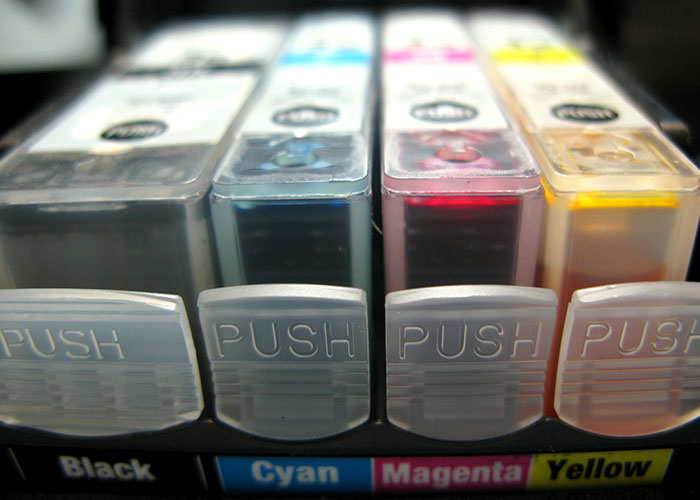 Printer cartridges.
Printer cartridges.
99% of what you want to print is black and white anyway. Modern printers make me miss the old fashioned dot matrix machines. A big box of ribbon paper and they just worked. You replace the carbon ribbon after about a thousand pages or so. So reliable and functional.
In an ideal world, most companies wouldn’t just go for the biggest profit and maximum growth. They’d also prioritize the user experience, ethical business practices, and providing the best quality products and services that they can realistically create (not just get away with).
However, we do not live in an ideal world. While profit-seeking isn’t good or bad in and of itself (it’s how businesses survive and thrive), it can lead to some serious problems if it’s always placed ahead of the customers’ wants and needs.
You build a loyal following by having a dependable, quality brand. On the flip side, if you make your customers’ lives more difficult and expensive, eventually, you’re going to push some of them away. And that’s relatively easy to do if any of your competitors offer cheaper, user-friendly alternatives.
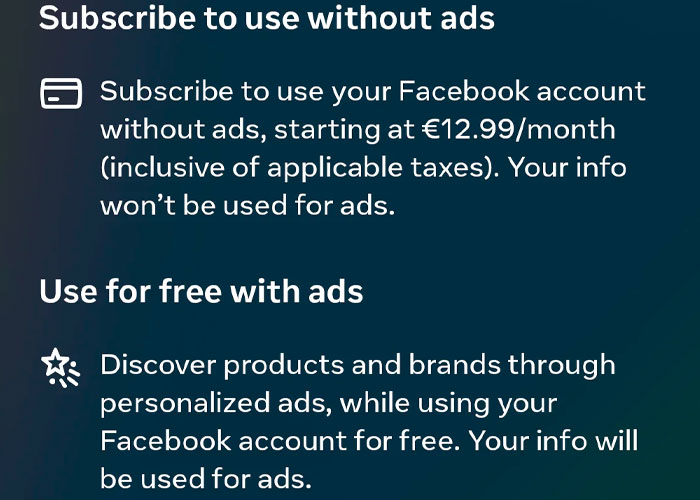 Subscription with ads. Ads was only widely accepted because “we had to maintain our work somehow”. Ads ruined the internet.
Subscription with ads. Ads was only widely accepted because “we had to maintain our work somehow”. Ads ruined the internet.
Then subscription came along, fine a paid version to get rid of those pesky adverts.
But hey ho, let’s get more money from both sides.
Also, premium content.
All content use the same platform.
They are forced to do extra work to separate content in the delivery and choose which content is premium.
It’s a scam on top of their subscription scam.
i am so done with all the ads, constant and never-ending commercialism being shoved down my throat. And on subscription TV - my subscription is meant to pay for services, but I'm paying for commercials! Do most companies not know they are making people hate products so much? And even worse - forcing you to choose what types of ads you want. How about f***ing NONE? Or one at the beginning. Or end? not 5-11 through the video, interrupting wherever?
 Hippity hoppity your data is now my property… or something along those lines.
Hippity hoppity your data is now my property… or something along those lines.
F**k at&t. F**k t-mobile. F**k these data breaches and zero consequences for the companies.
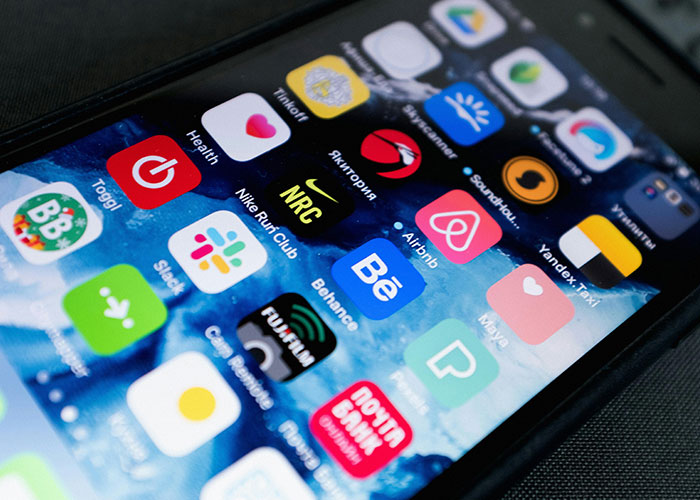 Everything needs an app. Especially physical devices. I don't want your cheap buggy app to use my thermostat, scale, battery, lock, or light bulb. Ship one if you want, but devices should conform to standards-based, documented protocols so I can control them however I want. I also don't want to install an app just to do something that works just fine on a website. Also requiring Internet connectivity is cr*ppy design. I don't want basic functionality depending on your servers being up (and requiring accounts and giving you unknown data). My whatever should not stop working because you decided to stop spending money on the servers. This is bad with software but egregious with hardware and unacceptable with household devices (my water heater should never depend on outside servers). I've been in tech a long time. While greed and control and access to sellable data drives lots of things, there is also an attitude surviving from the 90s and 00s that the lifespan of anything is a few years. This attitude infects product design even in fields where lifespans are decades and replacement costs are high as we add compute to everything (which can be a great thing). USB was successful not because it had one (ish) plug, but because it standardized the protocols devices used. All mice speak one protocol, so anything that knows it (hci class) can handle any mouse. Zwave and ZigBee tried to do this for household stuff, but instead we got vendor proprietary, Internet connected, phone-home, WiFi devices. Rant done.
Everything needs an app. Especially physical devices. I don't want your cheap buggy app to use my thermostat, scale, battery, lock, or light bulb. Ship one if you want, but devices should conform to standards-based, documented protocols so I can control them however I want. I also don't want to install an app just to do something that works just fine on a website. Also requiring Internet connectivity is cr*ppy design. I don't want basic functionality depending on your servers being up (and requiring accounts and giving you unknown data). My whatever should not stop working because you decided to stop spending money on the servers. This is bad with software but egregious with hardware and unacceptable with household devices (my water heater should never depend on outside servers). I've been in tech a long time. While greed and control and access to sellable data drives lots of things, there is also an attitude surviving from the 90s and 00s that the lifespan of anything is a few years. This attitude infects product design even in fields where lifespans are decades and replacement costs are high as we add compute to everything (which can be a great thing). USB was successful not because it had one (ish) plug, but because it standardized the protocols devices used. All mice speak one protocol, so anything that knows it (hci class) can handle any mouse. Zwave and ZigBee tried to do this for household stuff, but instead we got vendor proprietary, Internet connected, phone-home, WiFi devices. Rant done.
When there’s enough competition, the customer (theoretically) comes out on top. There is a caveat, however. If certain user-unfriendly but profitable practices (e.g., showing advertisements even when someone’s a subscriber) become widespread trends, then it might be very difficult to do anything different from your competitors.
From our personal perspective, some of the worst things that the modern internet has introduced include weird subscriptions to newsletters we never signed up for, spam and scam emails, and YouTube’s recent policy of bombarding us with ads. To be perfectly frank with you, it’s exhausting, and it makes you want to step away from the screen (which, ironically, can be a good thing for everyone’s physical and mental health).
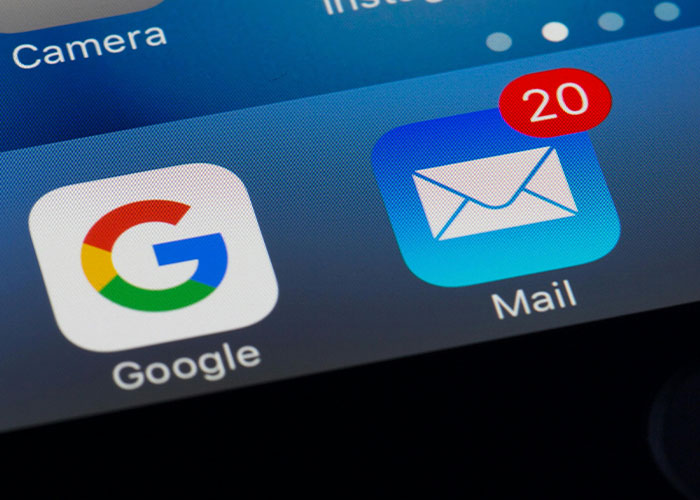 Unsubscribe button not being honored. Tactics include:
Unsubscribe button not being honored. Tactics include:
1. It takes 15 days to unsubscribe but 1 min to subscribe.
2. Sometimes link does not exists at all.
3. Sometimes it takes you to a non existent page.
4. Sometimes it asks you to login but you never had an account.
5. Sometimes they will randomly send emails even after unsubscribing , especially around holiday season. Like out of the blue they will email, I think they got a new incompetent marketing guy.
6. Them not realizing that they product they sell is not something I buy or need on a regular basis. Eg: indochino , how frequently do you think I buy a new suit.
7. The whole marketing email is an image and not an html. Clicking on it just opens the image or takes you to home page (mostly sites from India )
8. Somehow referencing the canspam act and sending it to their privacy email stops all the emails suddenly. But the. Point 5 happens.
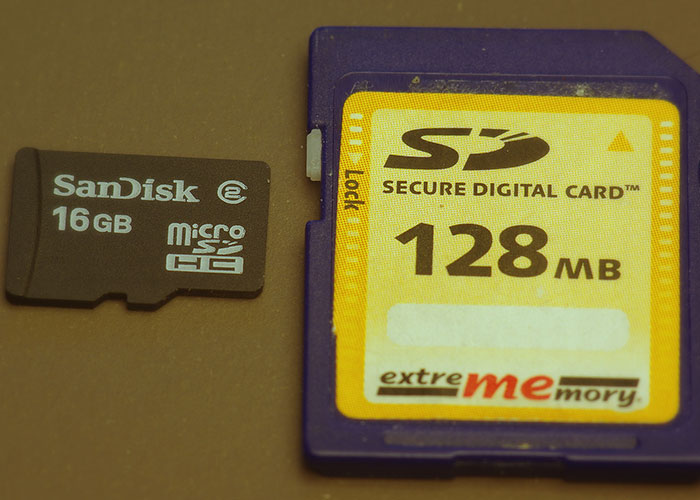 No SD card slot in cell phones. This straight pisses me off. I don't want your b******t cloud storage or whatever. I want my own storage in my own hands, k thanks.
No SD card slot in cell phones. This straight pisses me off. I don't want your b******t cloud storage or whatever. I want my own storage in my own hands, k thanks.
SD card slot has been absolutely mandatory for all the smartphones I've owned, won't settle for anything less.
 Having to subscribe to your car. Yes that's right, you're buying a brand new car for 75grand. and they make you pay for extras on a monthly basis instead of just having a base model and a premium model, it's just 1 model and you pay for the extra s**t.
Having to subscribe to your car. Yes that's right, you're buying a brand new car for 75grand. and they make you pay for extras on a monthly basis instead of just having a base model and a premium model, it's just 1 model and you pay for the extra s**t.
AND PEOPLE JUST ACCEPT THIS!! They think that coz they're saving money on fuel they're okay with spending it on the subscription!
But from a more objective point of view, something that hurts users and the environment is planned obsolescence. When you think about how short various tech products’ lifespans are, it really boggles your mind.
Sure, you don’t have to upgrade your smartphone every two or three years, but there is a noticeable drop in battery life and a rise in lag the longer you use the device. Having to charge our phones every day is not the bright and brilliant future we imagined!
 Selling AI "art" programs as alternatives to hiring creative professionals. And now there are these bs posts I see from people taking **commissions** to type words into a text to image generator for you. Come on, seriously, can this whole AI art thing collapse so that we can turn these bots toward calculating taxes or some s**t?
Selling AI "art" programs as alternatives to hiring creative professionals. And now there are these bs posts I see from people taking **commissions** to type words into a text to image generator for you. Come on, seriously, can this whole AI art thing collapse so that we can turn these bots toward calculating taxes or some s**t?
 Crypto. Magic internet money with a community of people all just trying to get other people stuck holding the bag.
Crypto. Magic internet money with a community of people all just trying to get other people stuck holding the bag.
It's a classic example of a bubble. It'll pop someday. Bitcoin and Ethereum and the rest aren't backed by any hard assets. It's basically Monopoly money.
 A new iPhone being released every year and Apple convincing people it has a ton of improvements.
A new iPhone being released every year and Apple convincing people it has a ton of improvements.
What are your biggest frustrations with tech products and services, dear Pandas? What tech business practices would you change if you had the power to do so? What companies do you think are more user-friendly than their competitors? Tell us what you think in the comments.
 Ads after subscription.
Ads after subscription.
I don't know what services this is about, but anything STILL getting ads while paying will never have me as a customer. If no one accepts, the product won't be for sale anymore.
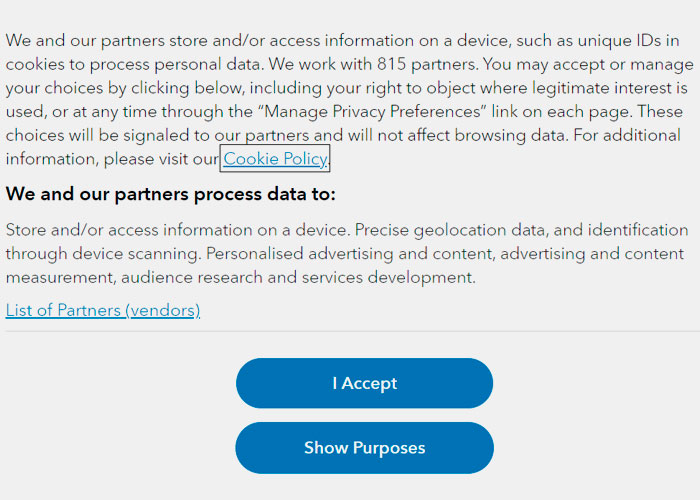 Accepting cookies.
Accepting cookies.
Just to continue on a site they’ll say accept or reject cookies. It’s easier for everyone to just accept. However, we’re selling our data to a host of companies who package it sell it to advertisers
About 50% of the time I use a site I decide to stop using it because I’m unticking legitimate interest having blocked other cookies and it’s not worth going through it to read whatever I was looking for. 100% of the time I use it, including this site, I’m deleting all browser cookies, history and data after use. And that’s coming from someone who lives in the EU. The internet is ruined by this sh!t
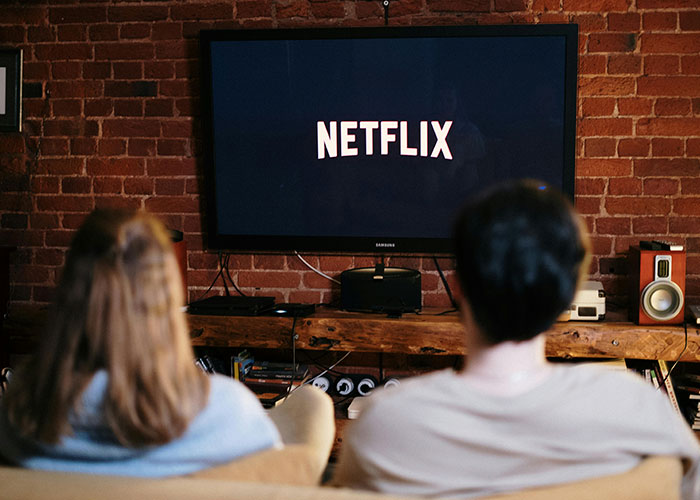 You don't actually own anything, you just own a license to view/listen/play it... and it can be revoked/edited at any time without consequence.
You don't actually own anything, you just own a license to view/listen/play it... and it can be revoked/edited at any time without consequence.
That's why I buy physical media. I bought it, it's mine. I own it...so Sony can't suddenly say "Sorry, we're deleting all 12 seasons of this show from your device, and we're not refunding the hundreds of dollars you paid". Then, of course, there's streaming...where you have to subscribe to multiple platforms to watch a full series. For example Law & Order is owned by NBC, but Peacock (also owned by NBC) only has seasons 14-20...and season 23 (no seasons 21 & 22). To watch the rest of the series you need Hulu (but ONLY if you subscribe to the $75 a month plan) or Amazon (at $1.99 PER EPISODE.) The heck with that.
 Cable TV packages that include hundreds of channels most people never watch but have to pay for. It forces consumers to overspend on content they don't want just to get access to a few channels they do.
Cable TV packages that include hundreds of channels most people never watch but have to pay for. It forces consumers to overspend on content they don't want just to get access to a few channels they do.
 Here’s a new product! (Uber! DoorDash! Amazon!) It’s so cheap and easy!
Here’s a new product! (Uber! DoorDash! Amazon!) It’s so cheap and easy!
One year later: Sorry! We had to raise prices! Sorry, you have to pay for a membership now! Sorry, we had to make the app really confusing so you’re not really sure what you’re buying! Sorry, you have to wade through 1 million ads to find what you’re looking for!
Sorry, not sorry!
 AI = Certainly artificial but lacking a great deal of intelligence.
AI = Certainly artificial but lacking a great deal of intelligence.
munificent:
Training generative AI on copyrighted material laboriously produced by artists and then using the result to put those same artists out of work.
This s**t needs to have the f*****g regulated out of it. Not just release some invasive product and then, possibly, maybe come out with the workaround if/when it misbehaves or gets out of control. After the damage has already been done. With impunity.
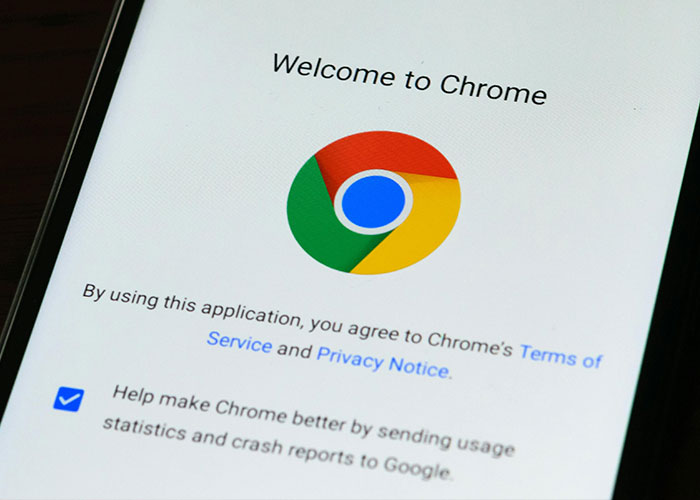 "I accept your 1000 page privacy policy and terms of service"
"I accept your 1000 page privacy policy and terms of service"
and the next thing you know you're living in a black mirror episode...
 Selling our data. It’s even so bad that our phones that use GPS track where we are and send our driving habits and check-ins to companies. Facebook sells our data as well. Who we’re friends with, height, weight, medical info we post, etc.
Selling our data. It’s even so bad that our phones that use GPS track where we are and send our driving habits and check-ins to companies. Facebook sells our data as well. Who we’re friends with, height, weight, medical info we post, etc.
Everything about us is sold. The only way to avoid that is to basically NEVER be online. For anything. VPNs are a joke and don’t do s**t. If they did what they advertise, we would have a lot more tech crime.
Remember: If you do not pay for it, you are the product. Not the customer.
The only way to keep your data safe is to not hand it over in the first place. The only way a site can keep your data safe is not to ask for it in the first place.
 Ticket surcharges, Uber flex fees, etc.
Ticket surcharges, Uber flex fees, etc.
Basically everything that has enabled greedy people to further reach into your pocket.
Mmmm, thank you for charging me the equivalent of a third ticket for the comedy show. You didn't even provide me with a tangible ticket.
 Subscription Traps: Makes signing up easy but canceling difficult, often hiding the cancellation process.
Subscription Traps: Makes signing up easy but canceling difficult, often hiding the cancellation process.
Always go to and find, review and bookmark the cancelation page before signing up. Also as soon as you sign up cancelation your product you just bought, it will still be valid for the subscription period, it won't renew automatically and you will get plenty of notices that it's about to expire. Then if you want to renew wait as long as you can and talk to a person and you can usually renew at a lower price than original, just hold out.
 I can't believe I don't see this in here, but the fact that most tech companies use their end users as testers is wild. Tons of the time you get something released that like, half works, and the end users or customers are used to find and fix bugs. It's everywhere man.
I can't believe I don't see this in here, but the fact that most tech companies use their end users as testers is wild. Tons of the time you get something released that like, half works, and the end users or customers are used to find and fix bugs. It's everywhere man.
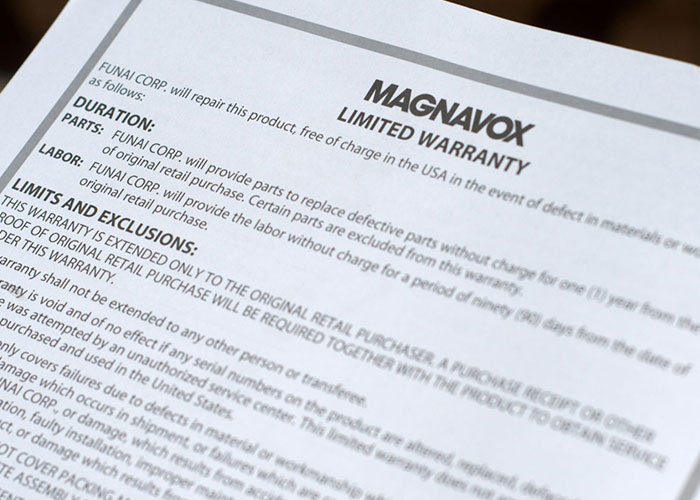 Extended warranties for electronics, which are rarely worth the cost given the low chance of a malfunction that would fall under the warranty terms, and often overlap with the manufacturer’s warranty.
Extended warranties for electronics, which are rarely worth the cost given the low chance of a malfunction that would fall under the warranty terms, and often overlap with the manufacturer’s warranty.
 Digital media in general. Yeah, I get why people would go in on it, convenience and the like, but for all the money we spend on it, we don't own a goddamned thing. Companies can go tits up, breakups, mergers, licenses can expire, digital storefronts are shuttered, etc. At any point the game/movie/song/TV show/whatever, that you PAID FOR, can be rendered unusable and unobtainable with zero notice and fewer ways to get it back.
Digital media in general. Yeah, I get why people would go in on it, convenience and the like, but for all the money we spend on it, we don't own a goddamned thing. Companies can go tits up, breakups, mergers, licenses can expire, digital storefronts are shuttered, etc. At any point the game/movie/song/TV show/whatever, that you PAID FOR, can be rendered unusable and unobtainable with zero notice and fewer ways to get it back.
It's been especially big in video game circles with various digital storefronts being shut down (the Nintendo 3DS and Wii-U stores *just* got the axe), announced to be shut down (the Xbox 360 store is set to go bye-bye this year), or held up only by way of extreme backlash (people raised unholy hell when Sony announced they were going to kill the PS3 store)... and there will be NO way get those games back unless you set sail for the Buccaneer Bay.
As the saying goes, if buying isn't owning, piracy isn't stealing.
Digital isn't a 'scam' if it is priced accordingly. Games through say Steam blur that line a bit because the game price isn't that much cheaper than if it was a hard copy. But movies are. I used to buy / save DVDs and bluray. Over time I realized it was pointless because the vast majority of of my collection I didn't want to watch more than once or twice. Out of hundreds, there were a handful of 'old friends' I'd watch again if bored / depressed. So I donated most of them to my local library. What I pay for the hundreds of hours of viewing time on netflix is very tiny fraction of what it would cost me to own those shows on disc. So I consider that a reasonable trade off. Basically I'm viewing it as a service or a rental instead of a purchase.
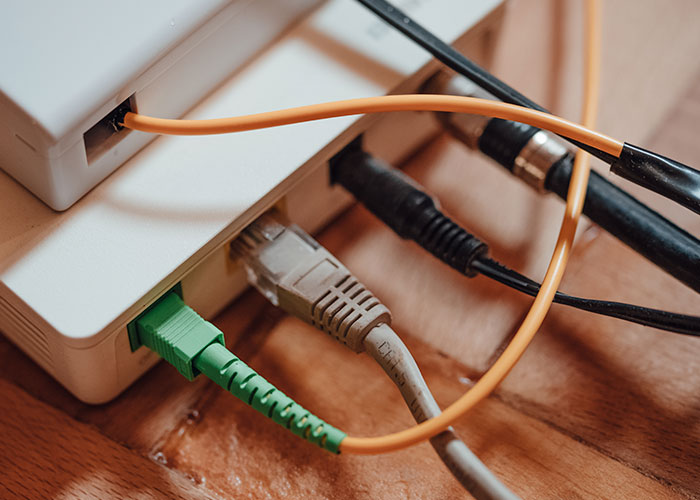 Data caps, literally not a technical reason for it. Throttling may make sense if they get overloaded but caps are literally just money grabs.
Data caps, literally not a technical reason for it. Throttling may make sense if they get overloaded but caps are literally just money grabs.
Data caps are a way of throttling usage. If everyone had unlimited data, the networks would be overloaded and the speed of everybodies connections would drop. It can also be done by rate limiting, but you wouldn't be happy if it took your cat video 5 mins to load. Network capacity has increased over the years, but so has usage. I remember the days when we had usage caps on websites and we were charged for data usage.
Calling something “Full Self Driving” and releasing it years before it’s ready all while it blows through stop signs and violates speed limits without care.
it used to be "If you don't pay for the product, then you are the product". Now it's "We expect you to pay, and you're STILL the product".
I don't know if this counts, but: When I buy things online, I make sure to never check the box "yes, I want to receive e-mails from [company in question]". But it seems like every time, they send me e-mails anyway! I know I can just click "unsubscribe", but I never asked for ad-mails from them in the first place!
Clicking unsubscribe can also tell a scammer that they've found an active email address to try out. Darned if you do, darned if you don't.
Load More Replies...I remember the days when I was younger and it was all such a shock to be scammed. Now I just wake up and automatically delete at least ten fake messages and emails saying there is a warrant out for my arrest due to an unpaid bill, voice messages in Chinese and people trying to sell me a new electricity plan
it used to be "If you don't pay for the product, then you are the product". Now it's "We expect you to pay, and you're STILL the product".
I don't know if this counts, but: When I buy things online, I make sure to never check the box "yes, I want to receive e-mails from [company in question]". But it seems like every time, they send me e-mails anyway! I know I can just click "unsubscribe", but I never asked for ad-mails from them in the first place!
Clicking unsubscribe can also tell a scammer that they've found an active email address to try out. Darned if you do, darned if you don't.
Load More Replies...I remember the days when I was younger and it was all such a shock to be scammed. Now I just wake up and automatically delete at least ten fake messages and emails saying there is a warrant out for my arrest due to an unpaid bill, voice messages in Chinese and people trying to sell me a new electricity plan

 Dark Mode
Dark Mode 

 No fees, cancel anytime
No fees, cancel anytime 



